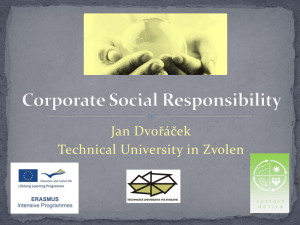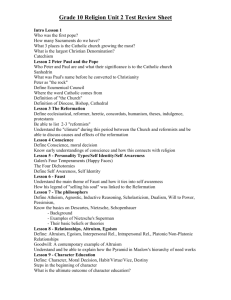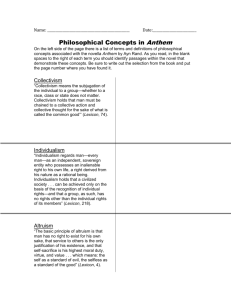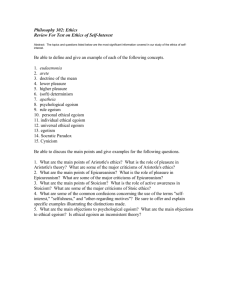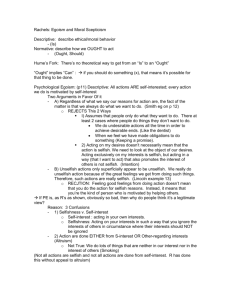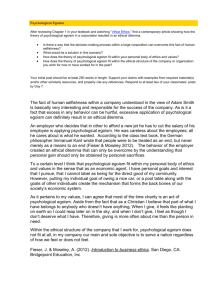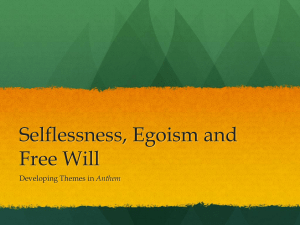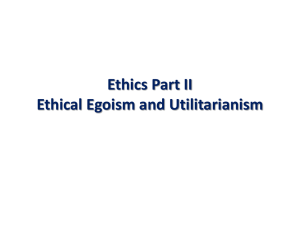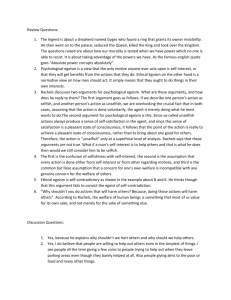egoism and altruism
advertisement
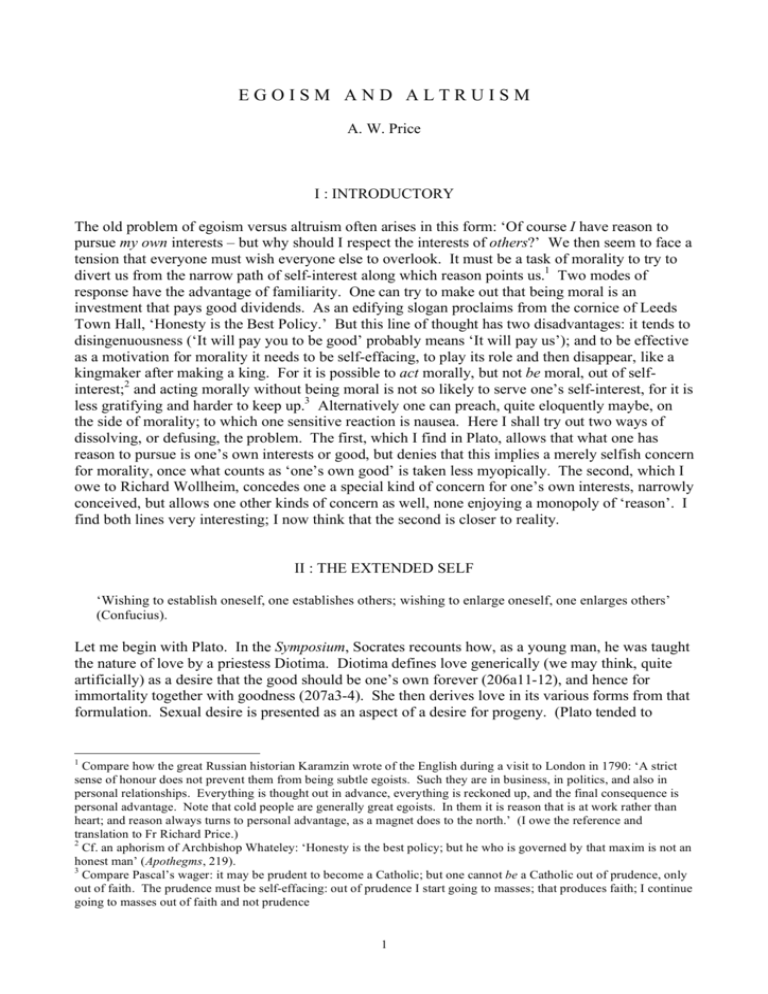
EGOISM AND ALTRUISM A. W. Price I : INTRODUCTORY The old problem of egoism versus altruism often arises in this form: ‘Of course I have reason to pursue my own interests – but why should I respect the interests of others?’ We then seem to face a tension that everyone must wish everyone else to overlook. It must be a task of morality to try to divert us from the narrow path of self-interest along which reason points us.1 Two modes of response have the advantage of familiarity. One can try to make out that being moral is an investment that pays good dividends. As an edifying slogan proclaims from the cornice of Leeds Town Hall, ‘Honesty is the Best Policy.’ But this line of thought has two disadvantages: it tends to disingenuousness (‘It will pay you to be good’ probably means ‘It will pay us’); and to be effective as a motivation for morality it needs to be self-effacing, to play its role and then disappear, like a kingmaker after making a king. For it is possible to act morally, but not be moral, out of selfinterest;2 and acting morally without being moral is not so likely to serve one’s self-interest, for it is less gratifying and harder to keep up.3 Alternatively one can preach, quite eloquently maybe, on the side of morality; to which one sensitive reaction is nausea. Here I shall try out two ways of dissolving, or defusing, the problem. The first, which I find in Plato, allows that what one has reason to pursue is one’s own interests or good, but denies that this implies a merely selfish concern for morality, once what counts as ‘one’s own good’ is taken less myopically. The second, which I owe to Richard Wollheim, concedes one a special kind of concern for one’s own interests, narrowly conceived, but allows one other kinds of concern as well, none enjoying a monopoly of ‘reason’. I find both lines very interesting; I now think that the second is closer to reality. II : THE EXTENDED SELF ‘Wishing to establish oneself, one establishes others; wishing to enlarge oneself, one enlarges others’ (Confucius). Let me begin with Plato. In the Symposium, Socrates recounts how, as a young man, he was taught the nature of love by a priestess Diotima. Diotima defines love generically (we may think, quite artificially) as a desire that the good should be one’s own forever (206a11-12), and hence for immortality together with goodness (207a3-4). She then derives love in its various forms from that formulation. Sexual desire is presented as an aspect of a desire for progeny. (Plato tended to 1 Compare how the great Russian historian Karamzin wrote of the English during a visit to London in 1790: ‘A strict sense of honour does not prevent them from being subtle egoists. Such they are in business, in politics, and also in personal relationships. Everything is thought out in advance, everything is reckoned up, and the final consequence is personal advantage. Note that cold people are generally great egoists. In them it is reason that is at work rather than heart; and reason always turns to personal advantage, as a magnet does to the north.’ (I owe the reference and translation to Fr Richard Price.) 2 Cf. an aphorism of Archbishop Whateley: ‘Honesty is the best policy; but he who is governed by that maxim is not an honest man’ (Apothegms, 219). 3 Compare Pascal’s wager: it may be prudent to become a Catholic; but one cannot be a Catholic out of prudence, only out of faith. The prudence must be self-effacing: out of prudence I start going to masses; that produces faith; I continue going to masses out of faith and not prudence 1 disapprove of it otherwise.) Even animals are willing to make any sacrifices for their young. How can that help the parents? Diotima explains: Mortal nature seeks, as far as may be, to perpetuate itself and become immortal. The only way in which it can achieve this is by procreation, which secures the perpetual replacement of an old member of the race by a new. Even during the period for which any living being is said to live and to retain his identity -- as a man, for example, is called the same man from boyhood to old age -- he does not in fact retain the same parts, although he is called the same person; he is always becoming a new being and undergoing a process of loss and reparation, which affects his hair, his flesh, his bones, his blood, and his whole body (207d1-e1, adapted from Walter Hamilton). To understand this, we may invent a category of ‘superbodies’ to set beside that of bodies: a body lasts a lifetime through the loss and replacement of physical parts; analogously, a superbody may last forever through the loss and replacement of bodies.4 Just as we might view a body at a certain time (constituted of certain matter, we would say cells) as a temporal part of a lasting body, so we might view a body as a temporal part of a superbody. Just as a body survives material replacement, so a superbody survives bodily substitution. Of course (Diotima would have to concede), there are striking differences: we, at any rate, need a pair of parents; offspring take time becoming physically like their parents; parents typically survive the birth of their children for some years. But the implication is this: such differences do not justify a differential concern that attaches to the future states of the same body, but not of the same superbody. For a superbody, reproduction is survival; for a body, reproduction is as good as survival. So much for bodies. What of minds? According to Diotima, much the same. And not only his body, but his soul as well. No man’s character, habits, opinions, desires, pleasures, pains, and fears remain always the same; new ones come into existence and old ones disappear. What happens with pieces of knowledge is even more remarkable; ... each individual piece of knowledge is subject to the same process as we are ourselves. When we use the word ‘memorizing’ we imply by using it that knowledge exits from us; forgetting is the exit of knowledge; and memorizing, by implanting a new impression in the place of that which is departing, preserves it, so that it appears to be the same. It is in this way that everything mortal is preserved; not by remaining for ever altogether the same in the manner of the divine, but by what is departing and being lost through age leaving a substitute of the same kind (207e1-208b2). So the identity of a mind over time is, similarly, a process of disappearance and replacement. Not yet explicit is how there may emerge what may, analogously, be called a ‘supermind’. That comes later (208e5 ff.), in a contrast between a common-garden heterosexuality and a highbrow pederasty: while women offer a man immortality through physical offspring, boys offer him immortality through mental offspring, namely thoughts that he imparts in the manner of Diotima educating Socrates. To the extent that his mental life continues, his mind becomes a member of an overlapping sequence of minds that constitutes a supermind. Of course (Diotima would again have to admit), reminding oneself of some piece of information is not precisely like conveying it to another; but, again, the implication must be that the difference is not significant. If we think, instead, not of memories of fact (that such and such occurred), but of memories of doing things (what it was like for the agent), something similar applies: whether I picture what it was like after reminding myself, or after being told, what it was like survives in memory.5 4 A body is like a single entry in a family tree, a superbody like a continuous line that one traces down the tree. Thus, only Wellington could remember what it was like to be Wellington at the Battle of Waterloo. But suppose that the mad George III, who imagined that he had been there, knew what it was like to be there through conversations with Wellington: then we could say that what it was like to be there, in Wellington’s shoes, survived in two minds, in Wellington’s and in George’s. 5 2 Implicit in all this is an imprecise criterion for identity over time either of a physical life, or of a mental life: stages of a life may count as stages of the same life so long as each stage either retains enough elements belonging to its predecessor, or contains enough replacements of elements belonging to it, where replacing is a relation that is partly causal, partly a matter of similarity (each stage causes its successor to resemble itself, to carry on where it left off). Later versions of the same criterion have been that stages of a physical life must be qualitatively and spatio-temporally continuous, and that each stage of a mental life must contain memories of its predecessor. What is less familiar is the claim that the criterion can be applied not only to bodies but to superbodies, not only to minds but to superminds: life does not stop at a rigid boundary between ‘I’ and ‘thou’, of mine and thine; the continuities that hold together individual lives can also link a chain of lives. However, before we proceed, we need to distinguish two kinds of theory about persons and their lives. Following Wollheim, I call these ‘constructionist’ and ‘non-constructionist’: By a constructionist theory I mean a theory ... that holds that everything that needs to be said about the events that make up the life of a person – about, that is, such events taken singly – can be said without introducing a person who has them ... By contrast, a non-constructionist theory is a theory that maintains that no event in a person’s life, even taken singly, can be adequately described without introducing the person who has it.6 Is the Diotima-Socrates view constructionist or non-constructionist? To make the question answerable, we need to replace Wollheim’s ‘person’ with Plato’s ‘soul’. We can then distinguish, more explicitly than Plato himself, a radical from a modest version: according to the radical, constructionist version, the soul is nothing but a construction out of mental events; it is identical to a mind, or (if the sequence of mental events overflows the limits of a single mind) to a supermind; according to the modest, non-constructionist version, a sequence of bodily and mental events constitutes the workings of a soul whose own identity rides free. Which variant is Plato likely to have intended? Surely the non-constructionist: not only because of his usual view of the soul as an imperishable immaterial substance, but also because he presumably envisages the soul as performing the renewing activity of memorizing old knowledge. But then we need to explain (as Plato does not) how a soul can count as achieving some good for itself when it is not the subject of that good. I suggest something like the following: a soul in living a life constantly attends to that life, but only occasionally (in moments of self-consciousness) to itself; thus it naturally comes to value the life for its own sake (so it sees it as good), and to identify with it (so it sees its goodness as its own); hence it will count it as a good for itself when that life goes well, even when the success falls within a stretch of that life of which it is not the subject. On either variant of the Diotima-Socrates view, radical or modest, constructionist or nonconstructionist about the soul, the implication will be this: if I am a soul, I will count a good as my own if it attaches to some state within a series of states, appropriately related, of which this is a member (where ‘this’ indicates some current physical or mental life-stage of mine). It will then be added that the appropriate relations include not only those linking states of a single mind or body, but also those linking states of a single supermind or superbody. What then becomes of egoism? We may take egoism here to be an overriding desire to achieve (or receive) the good for oneself. On the Platonic view that I have elaborated, egoism should embrace a concern for one’s physical and mental heirs; I have reason to count a future good as ‘mine’ so long as it falls within a life that is a continuation of my life, physical or mental. I may be outrageously nepotistic, caring only for self, family, and favourites; I will not be narrowly selfish. 6 The Thread of Life (Cambridge, 1984), 16. A constructionist view seems clearly right of nations: the events that made it true that Britain declared war on Germany in 1914 involved human agents like Asquith and Sir Edward Grey; they did not presuppose a further supra-personal agent, say Britannia. 3 Yet such an enlarged egoism still falls vastly short of altruism, if altruism is an impartial desire that people should enjoy the good. Can it be extended still more widely? Plato sees it as the goal of a philosophical and utopian politics to extend its limits as widely as possible, so as to include all the members of a city or polis: In this city more than any other, when any individual fares well or badly, they would all speak in unison the word we mentioned just now, namely that mine is doing well, or that mine is faring badly (Republic 463e). Through the abolition of family life, Plato intends that his guardians shall view one another indiscriminately as parents, siblings, or children (according to age), as if they all formed one physical family; and that they shall share their thoughts and feelings, as if they all formed a band of lovers. Further, he hopes that something of the same attitude will extend even to his proletariat, the artisans (who are allowed families). The upshot won’t be a full altruism, rather a polis-ism; and it won’t arise except in a polis extraordinarily organized. But it can be so organized (Plato thinks); and the poignant demands of famine-relief (and the like) mustn’t cause one to overlook that it is within a community that one can treat people well as individuals in ways that may help make their lives worth living, and not just as subjects of universal human needs whose satisfaction removes an evil without itself creating a good. (If positive goods do follow, that is their doing, not one’s own; and an attitude of special concern about what one can do oneself, though restrictive on altruism, is surely a condition of agency.) So much on the side of an un-myopic egoism which, taking egoistic motivation as a startingpoint, extends its field of operation to cover most, if not all, of the practicalities of altruism. Of course, the domain of egoism is then subject to our control: if we don’t have children, or lovers, or create a Platonic polis, egoism will remain restricted in its application. And it isn’t clear that we can argue from within egoism itself for acting so as to widen its applicability. (It is here that Diotima’s smuggling in the notion of desiring the good for oneself for ever is crucial: such a desire would motivate extending indefinitely at least the temporal boundaries of the self. However, while each man may desire immortality, it doesn’t clearly follow from anyone’s egoism that he must.) But at least the old dichotomy between egoism and altruism seems exploded: egoism can overflow into altruism. And an extended egoism can share with narrow egoism a rooting in our nature as it is, not as (ideally) it might have been. Far better, surely, a virtual altruism that is humanly motivated than an unqualified altruism that can only be preached.7 II : SELF-CONCERN AND LOVE FOR OTHERS ‘Man is the creature who cannot exit from himself’ (Proust). Extended egoism depended on the abolition of boundaries between lives. On the constructionist variant, the very talk of persons drops out as inessential, much like talk of nations. On either variant, concern for my future is partly or totally reconstrued as concern about future physical and mental states that stand in certain relations to how I am now. What concerns me is this life, the life I am leading. How far it extends depends on how we define its boundaries: no doubt we can if we wish refine the criterion of identity over time so as to ensure that lives are paired with persons, distinguished as we distinguish them now (involving bodies and minds, not superbodies and superminds). But that demarcation is more conventional than natural, and achieves tidiness at the cost of arbitrariness and artificiality. We may indeed, for example, claim that conception (or birth) 7 I explore this line of thought further, in a more scholarly style, in Love and Friendship in Plato and Aristotle, expanded edn. (Oxford, 1997). 4 marks the emergence of a new creature out of a process within another creature; but the physical continuity precludes any reason for a cut-off of concern. A narrow egoism, though consistent, is as ungrounded as Derek Parfit’s five-mile altruism (an impartial concern for welfare within a fivemile radius). Though I have argued that Plato must intend the more modest, non-constructionist variant, I now propose, for the sake of clarity of contrast, that we should keep in mind the constructionist variant, which takes all justifiable self-concern to be explicable in terms of identification (let us not ask, whose identification) with a continuing series of physical or mental states or events. This exemplifies philosophy at its most radical; one might almost say that to be philosophical is to excited, at least for a while, by its departure from common sense. But is it right? Let me take that ambitious question as equivalent to another: in resting its recommendation of an extended egoism upon a conception of self-concern that invites that extension, has it understood self-concern rightly? To restate that question, is the nature of human self-concern such that reflection can extend it into a concern for others? Or, on the contrary, is it integral to self-concern to stop short of concern for others? That something important is missing can be indicated, I now think, quite simply. Take Wollheim’s introduction of a notion which he calls, felicitously, ‘the tremor’: I am told something like the following: Someone whom I know will to-night meet a friend whom he loves and misses. Someone whom I know will tomorrow morning wake up blind. Then I learn that this someone, the someone whom I know and to whom this will happen, is me. There is a characteristic ... way in which I shall respond to such a lesson. This response I call ‘the tremor’.8 The thought that will characteristically generate the tremor is just this: it is coming to me. On the constructionist view, that is equivalent to something like this: that experience will be linked to this present mental state in such-and-such a way. But, so construed, the thought would not seem to yield the tremor. There is an intuitive objection, and a reflective one. Intuitively, the thought so construed at once invites the response, ‘So what?’ (Compare the effect of translating ‘Some day I shall die’ as something like ‘Some day the series of experiences linked in such-and-such a way to this experience will come to an end.’ That may still sound regrettable, if the series promises well; but it can hardly cause a frisson, an inconsolable – if happily transient – sense of fright.)9 On reflection, there is the curious implication that there is little ground to prefer leaving the dentist’s to entering the dentist’s, little ground to prefer having already got over some suffering to facing it shortly. For if all we have is a series of experiences, why should it matter very much where within the series some good or evil occurs? In either case, the suffering happens, and passes.10 In neither case is there room for the thought which really does mark a contrast that tells, ‘It’s coming towards me’ versus ‘It’s going away’, a thought that presupposes that I am staying put.11 A contrast within my point of view between my present on the one hand, and my past or future on the other, remains; the contrast between my past and my future has been softened. The tremor is a response that is spontaneous, involuntary, unmediated. It does not arise through the following steps: I foresee something good or bad for a future self; I side with that self; I feel the tremor. It is enough that I learn that it will be me, and am able to let that thought register and reverberate.12 The very notion of siding-with needs scrutiny; if it is equivalent to identifying with someone one loves, it is both complex and variable in itself, and quite unlike self-concern. 8 Op. cit., 237. Parfit notes this corollary, and welcomes it; Reasons and Persons (Oxford, 1984), 281. 10 To express the thought in the language of temporal ‘selves’: my present self can’t want to suffer itself; but why should it prefer a past self to suffer rather than a future self? Why shouldn’t it be neutral between selves other than itself (rather as I may be neutral between other members of my own family). 11 Just think of the difference, as one watches a film, between the train that comes at one out of the screen, and the train that one sees receding in the distance. 12 I must accept it, as Wollheim puts it; op. cit. 236. 9 5 Identifying-with is an optional, if instructive, exercise of the imagination: I place myself imaginatively at someone else’s point of view, and imagine myself with experiences, beliefs, and desires that replicate his actual states. How I then respond, not in my imagination, will depend on my attitude to him. Suppose that I love him. I will then tend to think it particularly important that his experiences be good, his beliefs true, his desires fulfilled. Or else, ironically aware of the contingency of my love (especially from his point of view), I may retain a keen interest in how things go with him that yet remains wholly non-practical and unmotivating, like an attachment to a fictional character such as Lucien de Rubempré or Tess of the D’Urbervilles.13 Thus my response to identifying with him is mediated by my attitudes, and my attitudes towards those attitudes. The tremor arises more simply: I have just to accept that it will be me.14 Self-concern is thus sui generis. In that it is contingent upon so much less than concern for others both in its emergence, and for its motivating force, it is specially privileged; but it does not follow that it is more rational than concern for others, either in itself or in its effects. Rationality just isn’t what is here at issue. Nor need it generate, let alone justify, an overriding preference for one’s own well-being: what defines self-concern is the kind, not the degree, of concern that it is. However, I think (apparently unlike Wollheim) that it has to be conceded that self-concern does tend to fuel egoism: as if by a natural illusion of perspective, it is rather common to assign greater weight in practice, in forming preferences if not valuations, to those future ills, namely one’s own, that cause one the ‘tremor’. Yet this tendency need not prevail. One point is that self-concern’s position of privilege is also a restriction. Not only does it incorporate no attitudes, it resists fleshing out by many of the attitudes that can most enrich a concern for others. Even self-love, which one might hope, in the form of narcissism, to lend an enthusiasm to self-concern, is more often a form of negation, which is how Wollheim describes it: Self-love is a denial that anything outside the person has value or could justify dependence. Self-love then is an alternative to love, but not a variant of it. It is also an alternative to envy, to which it bears a closer resemblance.15 Another point is that, by virtue of its very insistency, self-concern is a more trying state than other kinds of concern: it may generate an anxiety that one escapes in taking on a concern for others. No doubt self-sacrifice can have nobler motives; but none, perhaps, more efficacious. In fact, there are a multiplicity of reasons for which I may prefer another to fare well. I may love him. Or I may generally have succumbed to what Anna Freud aptly called ‘altruistic surrender’ (so common, in a surely felicific form, in the attitude of parents towards their children): disappointed, or maybe satisfied, in my own life, I wish for others what no longer excites me in my own case. Thus egoism is not necessary, at least in any extreme form; is altruism (that is, an impartial concern for people’s welfare) even possible? While I am sceptical of Plato’s attempt in the Symposium and Republic to extract a virtual altruism from a generous egoism (for the reason that it disregards or misconceives self-concern), I accept one of its presuppositions: that altruism, if it is not to turn out an artificial invention of an unreal morality, would need to be rooted in a less transcendent aspect of human nature. So long as it remains doubtful what that could be, altruism, in its full sense, may best be left on the shelf. That our consciences should typically require it of us is intelligible within a diagnosis of conscience; it is not thereby justified. I take it to be humanly inevitable that full altruism should be rather preached than practised. Saints exist, and we are not 13 It was before becoming a tragedy himself that Oscar Wilde called the death of Lucien de Rubempré the greatest tragedy of his life. 14 Cf. Wollheim, op. cit. 240-1. 15 Ibid., 252. A narcissism that is not envy fails self-love in another way: it tends to generate narcissistic object-choice, which is one entry into loving others (cf. my Love and Friendship in Plato and Aristotle, appendix 2). 6 even worthy to praise them. Yet even they, I would suppose, love those they are helping more than those they are not; and if it is open to you and me to be occasional heroes of morality, and not its dupes or humbugs, it cannot demand full altruism of us.16 Finally, and very briefly, there is the question what metaphysic of the self is presupposed in self-concern. It must be implicit that there is a continuing self who is the subject of experiences, the agent of actions; no doctrine of the nature of that self need be assumed. For myself, I would equally recoil from an identification of the self with an immaterial substance (as if that could be integral to any pattern of human concern), or with the brain (which would seem to confound a contingent condition of personhood with persons).17 Until a positive view has been successfully worked out, philosophy will be free to insinuate that self-concern rests upon a mistake. But perhaps that should not trouble us. I end with ‘the vulgar’ moral that F. H. Bradley thought, in such cases, ‘on the whole, to be the best’: Seeing all we have of philosophy looks away (to a higher sphere doubtless) from the facts of our unenlightened beliefs and our vulgar moralities, and since these moralities are what we most care about, therefore we also should leave these philosophers to themselves, nor concern ourselves at all with their lofty proceedings.18 16 I concede that this may shock the demanding moralist. But let me quote from memory some words of Logan Pearsall Smith: ‘It is a commonplace that one should practise what one preaches; but the man who would preach what he and his hearers practise must incur the severest moral disapprobation.’ 17 The worry that I might, for all I know, be a brain in a vat is a worry whether I really exist; if I am anything, I am a human agent (unless I’m wholly paralysed). 18 Ethical Studies, 2nd edn. (Oxford, 1927), 41. 7
